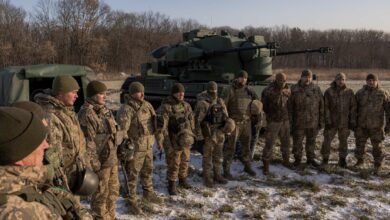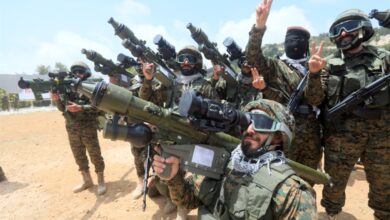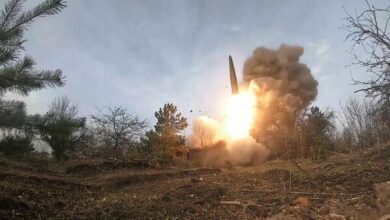Monumental Interview: Putin reveals His stances on Ukraine and NATO in a dialogue with Carlson

Prepared by Dr. Dimitri Breijha, March 19- 2024

This is the most significant speech since the inception of the military operation in Ukraine and the beginning of the Russian President Vladimir Putin’s election campaign domestically, where President Putin conducted an interview with the American journalist Tucker Carlson on January 9, 2024. The interview covered various historical and political topics.
Putin discussed the ongoing war in Ukraine and the prospects for peace between the two countries, in addition to reviewing the economic situation in Russia. He affirmed Russia’s readiness to provide gas to Europe through the “Nord Stream 2” pipeline and addressed several other important issues.
In efforts to avoid any escalation of the conflict, Putin emphasized that Russia does not seek to expand its war into other countries like Poland and Latvia, indicating that Russia will defend its interests firmly but will not escalate the crisis further.
This interview comes amidst the escalating tension between Russia and the West, with Putin stressing the importance of international understanding and the need to find peaceful solutions to international crises, while emphasizing that Russia will vigorously defend its interests.
In a historical and political context, Putin discussed many important matters, such as the establishment of Ukraine as a state during the Stalinist era and the challenges the country has faced since then.
He also highlighted the complex history of relations between Russia and the West, including NATO issues, Western expansion, and the role of the United States in supporting Russian opposition.
History of Russia-Ukraine Relations: From Roots to Modern Conflicts
According to Russian President Vladimir Putin’, the history of Russia-Ukraine relations dates back to the early centuries of the formation of the Russian state in the ninth century.
In 862, the Central Russian state was founded when Prince Rurik from the Scandinavian countries was called to rule in Novgorod. In 988, Russia was baptized, and Christianity Orthodoxy was adopted, contributing to the strengthening of the Central Russian state.
President Putin believes that as the ages progressed, relations began to develop between the southern part of Russian territories, including Kiev, and the Grand Duchy of Lithuania.
In 1654, those who took control of Ukraine requested sending people of Russian origin and Orthodox faith to them, but Warsaw rejected these demands, leading them to turn to Moscow for help.
Ultimately, the Zemsky Sobor Council (the supreme parliamentary body in the Russian Empire in the 16th and 17th centuries, a complex of deputies representing all social classes including the nobility, senior churchmen, representatives of the common people, including merchants and townsmen) made a decision in 1654 to make the southern part of Russian territories part of the Moscow Kingdom.
Despite starting a war with Poland, peace was concluded after 13 years, with Poland ceding the left bank of the Dnieper River to Russia. Subsequently, relations between Russia and Ukraine continued amidst various historical events such as World War I, agreements with Hitler, and cooperation with Poland, affecting policies and developments in the region over the ages.
After World War I, the Austrian General Staff began promoting the idea of Ukraine and Ukrainians, attempting to undermine Russian power in the region and create favorable conditions for themselves in the border region. Concurrently, ideas of Ukrainian independence emerged in the 19th century, but most of these roots emphasized the need for good relations with Russia.
With the 1917 revolution and the outbreak of the Russian Civil War, the Bolsheviks attempted to regain control of the state, leading to wars with Poland and the signing of a ceasefire in 1921, where the western part of Russian territories was ceded to Poland again.
In 1939, after the cooperation between Poland and Nazi Germany, Hitler offered Poland a friendship and alliance agreement, but it was rejected, leading it to participate with Germany in dividing Czechoslovakia. These events and others formed a complex historical context for relations between Russia and Ukraine.
After World War II, under the influence of political divisions and international conflicts, the Soviet Ukrainian state was formed as part of the Soviet Union. With the collapse of the Soviet Union in 1991, Ukraine became an independent state.
Despite its independence, relations between Russia and Ukraine remained influenced by shared history, cultural and economic ties between the two countries. However, tensions between them increased over the years, including political disputes and military confrontations in border regions such as the Crimean Peninsula and eastern Ukraine.
Currently, relations between Russia and Ukraine remain tense, with issues such as the conflict in eastern Ukraine and the status of the Crimean Peninsula being major causes of this tension. It is important for the countries to work towards reducing tensions and seeking peaceful solutions to ongoing conflicts.
Key Points from Vladimir Putin’s Interview
The Russian President addressed several important issues, including:
First: Emphasizing the importance of reaching an agreement between Russia and Ukraine sooner or later.
Second: Indicating that NATO’s options include recognizing Russia’s control over the new territories.
Third: Suggesting that the world will change irreversibly regardless of how the crisis in Ukraine ends.
Fourth: Pointing out Russia’s success in becoming the leading economy in Europe by the year 2023, despite the sanctions and pressures imposed by the United States, which did not significantly affect it.
Fifth: Describing Ukraine as an artificial entity established during the Stalinist era, noting that Ukrainians mean “people living on the outskirts” in Russian.
Sixth: Affirming that NATO has expanded five times despite promises not to expand eastward.
Seventh: Mentioning Russia’s readiness to join NATO after the collapse of the Soviet Union but the proposal was rejected.
Eighth: Stressing on the policy of sanctions imposed by the United States on Russia after the collapse of the Soviet Union.
Ninth: Affirming Russia’s readiness to supply Europe with gas through the Nord Stream 2 pipeline, but Germany faces challenges in this regard.
Tenth: It was mentioned that he proposed building a unified air defense system with the United States during his visit there.
Last: Referencing the sanctions policy imposed by the United States on Russia after the collapse of the Soviet Union.
The Western media’s attitude for the Putin interview
According to reports from several media outlets, the reaction of Western media to Tucker Carlson’s interview with Russian leader Vladimir Putin highlights fear and animosity. The Guardian described the interview in Moscow as a “new low for journalism” in its report, while the Mirror Tabloid labeled the participants in organizing the meeting as “enemies of the United States and the West.” The New York Times expressed concern about Tucker Carlson’s return to the spotlight after the cancellation of his program on Fox News, and CNN decided not to mention the interview on air at all.
The number of viewers for the interview on the social media network “X” surpassed 40 million views in just four hours.
Western media outlets seem unwilling to listen to the Russian perspective on international political issues. However, the American audience is eager to learn more about the reasons for the war in Ukraine and the political differences between Russia and the United States.
In an unexpected move, the American president followed the press statement with an emergency address to the nation, attempting to justify keeping classified documents at home.
In this way, the conflict between Western media and the Russian stance on political issues is evident in the age of social media. Voices and perspectives compete on screens and digital pages, while the other voice is silenced through channel blocking or closing social media pages.
The interview between Russian President Vladimir Putin and American journalist Tucker Carlson was a paramount moment, according to former U.S. intelligence officer Scott Ritter’s assessment.
Ritter expressed his belief that this interview could be decisive in preventing a conflict between the West and Russia, emphasizing the importance of both sides negotiating to avoid a potentially catastrophic military confrontation. He praised the cooperative spirit displayed in the interview, noting Tucker Carlson’s meticulous preparation and Putin’s readiness for dialogue.
During the interview, Putin revealed vital information about Russia’s history and its relationship with Ukraine, shedding light on the West’s role in exacerbating the crisis. According to Ritter, this interview opened the door to a deeper understanding of Russian positions and sentiments.
The interview was published on Carlson’s official website on February 8th and lasted for more than two hours, during which the journalist asked about 60 direct and explanatory questions to the Russian leader.
Within seven hours of posting the video on YouTube, it garnered over 60 million views, was reposted over 176,000 times, and received over 541,000 likes.
In a short time, the number of views rose to 70 million, with over 3.1 million shares, and the interview was listed among the top three trending topics.
Earlier, there were expectations that the interview would be controversial in American society. Ritter described Carlson’s efforts as indicative of journalism seeking to uncover unsettling actualities.
Russian Opposition Abroad and Vladimir Putin’s Interview
Diligently, the Russian opposition received President Vladimir Putin’s speech, posting many sarcastic comments and sharp criticisms of the speech’s content. Political analyst Fyodor Krasheninnikov provided statements explaining the reason for conducting an interview with Putin and analyzing its content.
Krasheninnikov pointed out that the interview had a threatening tone, showing Putin’s unwillingness to make any concessions without achieving his own conditions, suggesting the continuation of the conflict for a long time. While some may view it as a humorous interview, he considered it a “petrifying” interview.
He also points at Putin’s hint during the interview about his readiness to exchange the prisoner Ivan Gerschkovich, accused of espionage in Russia, for an officer in the Federal Security Service, casting doubt on the credibility of this proposal.
Regarding Putin’s claim of Russia’s lack of interests in Poland and Latvia, Krasheninnikov sees it as part of Putin’s strategy to achieve his own goals without risking a confrontation with NATO, believing that Putin wants to show his lack of interest in those countries to calm international concerns.
As for manipulating facts during the interview, Krasheninnikov sees it as a common behavior from Putin, where he continues to manipulate facts to suit his political aims without facing punishment or criticism.
Regarding the importance of the interview for Russian propaganda, it is considered a successful step, as it gave Putin the opportunity to communicate directly with the Western audience through Carlson, without editorial restrictions or facing embarrassing questions.
Commenting on the interview, opposition politician Natalia Shafshukova analyzed Putin’s distortion of facts and manipulation of historical events during the meeting, confirming that Putin appears ready to negotiate but at the same time uses manipulation of facts to distort historical events.
Shafshukova also expressed dissatisfaction with Tucker Carlson’s inability to control the situation and Putin’s manipulation of facts, stating that this interview resulted in enhancing Putin’s image instead of the expected opposite effect.
Shafshukova concluded her analysis by expressing concern about the deterioration of power in Russia, as it seems that Putin no longer trusts his aides and focuses more on his personal vision without paying attention to facts or confronting reality.
Russia’s Domestic Scene and Putin’s Interview
When the Russian talk about Carlson’s interview with President Vladimir Putin, optimism and readiness to listen to their leader’s words appear, as President Putin is considered a key figure in Russian politics, and his interviews are an opportunity for the people to understand his stands and vision for the future.
This interview comes at a critical time as the scheduled presidential elections approach. Therefore, it will play an important role in shaping the Russian public opinion and directing thinking towards the future.
President Putin is open to dialogue, which is evident in his acceptance of the interview and his discussion of important issues facing the country. This interview was an opportunity for President Putin to clarify his policies and vision for Russia’s future, thereby enhancing his popularity at a time when the country is heading towards new elections. Given the current circumstances and challenges facing the country, this interview is timely in directing the discussion towards important issues such as the economy, security, and international relations. Therefore, this interview is expected to have a significant impact on the Russian public, reinforcing their confidence in leadership and political stability.
Conclusions
Putin demonstrates his strength and seeks to assert it before the West, especially the United States, ahead of the American presidential elections, through his interview with American journalist Tucker Carlson, who is affiliated with the Republican Party and the faction supporting former President Donald Trump. The interview addressed the war in Ukraine and peace opportunities, with Russian President Vladimir Putin reaffirming Russia’s readiness to supply gas to Europe through the “Nord Stream 2” project, in addition to many other issues.
This interview comes in the context of the current escalation in relations between Russia and the West due to the war in Ukraine, where political and military stakes have been heightened. It serves as an attempt by Putin to clarify his positions and reaffirm his political and military strength.
During the interview, Putin demonstrates his willingness to defend Russia’s interests while emphasizing his lack of desire to escalate the conflict beyond the borders of Ukraine, reflecting a cautious and balanced strategy towards regional tensions.
Putin’s acceptance of conducting this interview with Carlson reflects a diplomatic strategy, seeking to improve Russia’s image in the Western world and change the prevailing media narrative about the conflict in Ukraine. The West attempts to exploit it to impose sanctions on Russia and exert pressure. On the other hand, the West may attempt to impose further dominance over the media after this interview, as it realizes that Russia effectively utilizes soft power tools, undermining Western propaganda about the threats posed by Russia to the Western world





